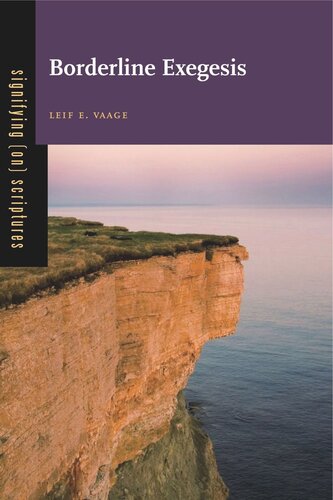

Most ebook files are in PDF format, so you can easily read them using various software such as Foxit Reader or directly on the Google Chrome browser.
Some ebook files are released by publishers in other formats such as .awz, .mobi, .epub, .fb2, etc. You may need to install specific software to read these formats on mobile/PC, such as Calibre.
Please read the tutorial at this link: https://ebookbell.com/faq
We offer FREE conversion to the popular formats you request; however, this may take some time. Therefore, right after payment, please email us, and we will try to provide the service as quickly as possible.
For some exceptional file formats or broken links (if any), please refrain from opening any disputes. Instead, email us first, and we will try to assist within a maximum of 6 hours.
EbookBell Team

5.0
58 reviewsIn Borderline Exegesis, Leif Vaage presents an alternative approach to biblical interpretation, or exegesis—an approach that bends the boundaries of the traditional North American methodology to analyze the meaning of biblical texts for a wider audience. To accomplish this, Vaage engages in a practice he calls “borderline exegesis.” Adapting anthropological notions of borderlands, borderline exegesis writes biblical scholarship peripherally, unearthing the Bible’s textual and discursive borderlands and allowing biblical texts to be at play with the utopian imagination.
The book’s main chapters comprise four case studies that engage in a “divergent reading” of the book of Job, the Gospel of Matthew, the Epistle of James, and the book of Revelation. Informed by the author’s time in war-torn Peru, these chapters take on themes that the poor and disenfranchised have historically claimed—themes of social justice, the legitimacy (or lack thereof) of prevailing social practices, and, most importantly, utopian demand for another possible world. The chapters are held together by the presentation of a greater theoretical framework that provides reflection on the exegetical practices within and confronts biblical scholars with important questions about the aims of the work they do. Taken as a whole, Borderline Exegesis seeks to disclose what the professional practice of textual interpretation might become if we refuse the conventional distances between academic practice and lived experience.